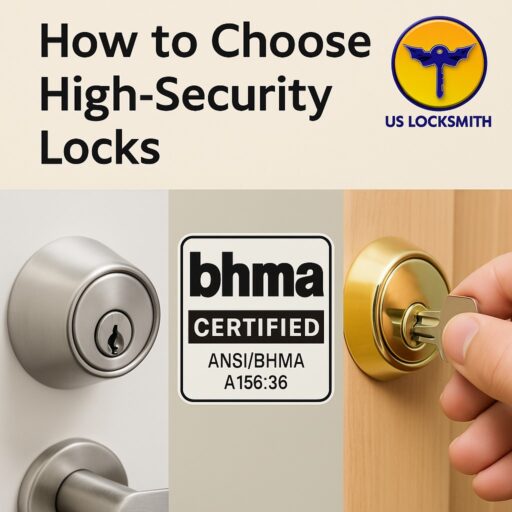Chasing the right locks represents your primary security defense beyond mere convenience. South Florida provides a paradise-like environment but it remains a prime location for property criminal activities. The FBI together with the Florida Department of Law Enforcement released recent data which shows:
-
Miami (Miami-Dade County) consistently ranks among the top cities in Florida for burglary and larceny-theft, with over 12,000 reported property crimes annually.
-
Fort Lauderdale (Broward County) reports some of the highest property crime rates per capita in the state, including break-ins, vehicle thefts, and vandalism.
-
West Palm Beach (Palm Beach County) sees elevated rates of residential burglaries and forced entry, especially in dense or tourist-heavy areas.
In a region where crime, tourism, and dense urban development intersect, securing your property with high-grade locks is not just smart — it’s essential.
Whether you’re upgrading an old deadbolt in your Fort Lauderdale home or improving commercial security in Miami Beach, here’s what to consider when selecting a new lock.
1. Know Your Lock Types
Single Cylinder Deadbolt
Operated with a key from the outside and a thumb turn from the inside. Ideal for most residential front doors.
Double Cylinder Deadbolt
Requires a key on both sides; good for doors with nearby windows, where intruders might try to reach in and turn the knob.
Mortise Locks
Integrated deadbolt and latch mechanisms. Heavy-duty and secure, commonly used in commercial settings but increasingly seen in high-security homes.
Smart Locks
Allow access via code, smartphone, or biometrics. Many models integrate with home automation systems and provide remote access logs.
2. Check for BHMA/ANSI Security Ratings
In the U.S., locks are graded for security and durability by the Builder’s Hardware Manufacturers Association (BHMA) in conjunction with ANSI standards.
-
Grade 1 (ANSI/BHMA A156.36 & A156.2): Highest security, suitable for commercial and residential exterior doors
-
Grade 2: Good security for residential use
-
Grade 3: Basic protection — best for interior doors or very low-risk areas
Tip: For exterior doors in Florida homes or businesses, always choose Grade 1 hardware when possible.
3. Don’t Ignore Key Control
Many burglaries happen without forced entry, because someone already had a key copy.
High-security brands like Medeco and Mul-T-Lock offer patented keyways and restricted duplication, meaning keys can’t be copied at the corner hardware store. Only authorized locksmiths with proper documentation can make duplicates.
4. Florida’s Climate = Rust and Failures
Locks in Florida are exposed to salt air, rain, and humidity. If you live in coastal cities like Miami Beach or Palm Beach, corrosion is a real issue.
Choose locks with:
-
Weather-resistant coatings
-
Stainless or hardened steel components
-
Protective cylinder caps for outdoor padlocks
This is especially critical for gates, garages, and utility doors.
5. Aesthetics Shouldn’t Be an Afterthought
High-security doesn’t mean ugly. Brands like Schlage, Emtek, and Kwikset offer stylish finishes like matte black, satin nickel, and aged bronze that can match modern or traditional home designs — while still offering ANSI-rated protection.
6. Price vs Value
While a $30 deadbolt may seem like a deal, the cost of a break-in far outweighs the savings. In high-crime ZIP codes in cities like Orlando or Riviera Beach, investing in Grade 1 hardware or smart access control is worth every dollar.
Consider your budget, but don’t skimp on:
-
Exterior entry locks
-
Garage door and back gate locks
-
Any lock protecting high-value equipment or entry points
7. Get Help from a Licensed Florida Locksmith
No matter how good is the lock the installation defeats the purpose.
A professional locksmith can:
-
Recommend locks suited to your security level and environment
-
Install them correctly to manufacturer specifications
-
Provide maintenance, rekeying, and smart lock integrations
✅ Some Thoughts:
The installation of high-quality locks represents a basic yet effective measure for protecting your home or business when you reside in Florida which has property crime rates exceeding the national average.
Whether you’re in need locksmith in Miami Beach, locksmith in Miramar, or locksmith in Delray Beach make lock security part of your overall strategy — not an afterthought.
Need Help Choosing or Installing the Right Lock?
At Professional Locksmith , we’ve helped thousands of homeowners and businesses across South Florida secure their properties with Grade 1 hardware, weather-resistant systems, and modern smart locks.
Call us today or contact us for expert advice and installation
Interested in reading about some of our favorite Medeco locks?
Want to know more about us? Still have some questions?
Check out our many other pages for your locksmithing needs.

